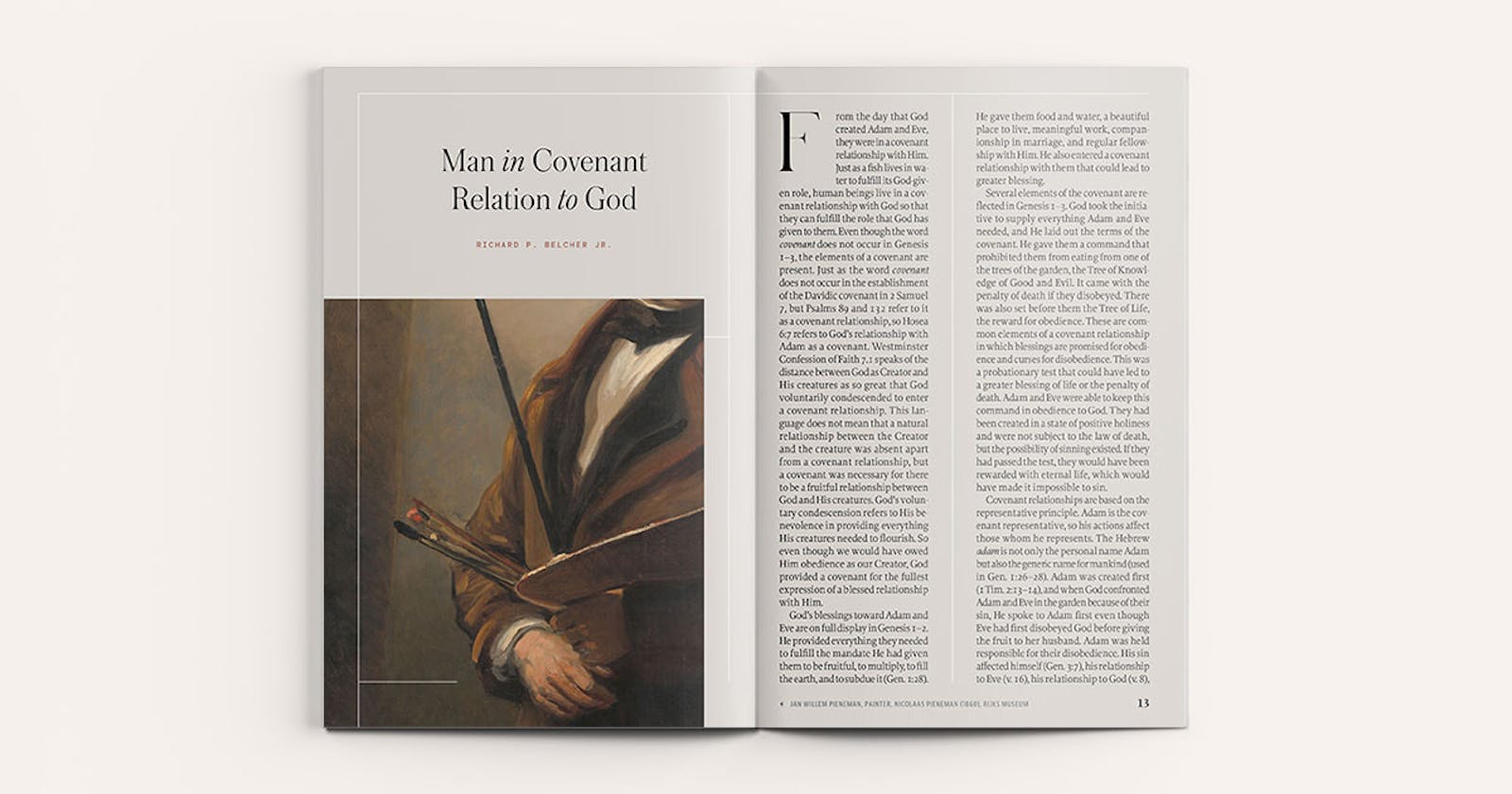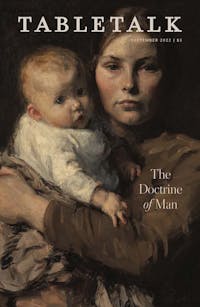
Request your free, three-month trial to Tabletalk magazine. You’ll receive the print issue monthly and gain immediate digital access to decades of archives. This trial is risk-free. No credit card required.
Try Tabletalk NowAlready receive Tabletalk magazine every month?
Verify your email address to gain unlimited access.
From the day that God created Adam and Eve, they were in a covenant relationship with Him. Just as a fish lives in water to fulfill its God-given role, human beings live in a covenant relationship with God so that they can fulfill the role that God has given to them. Even though the word covenant does not occur in Genesis 1–3, the elements of a covenant are present. Just as the word covenant does not occur in the establishment of the Davidic covenant in 2 Samuel 7, but Psalms 89 and 132 refer to it as a covenant relationship, so Hosea 6:7 refers to God’s relationship with Adam as a covenant. Westminster Confession of Faith 7.1 speaks of the distance between God as Creator and His creatures as so great that God voluntarily condescended to enter a covenant relationship. This language does not mean that a natural relationship between the Creator and the creature was absent apart from a covenant relationship, but a covenant was necessary for there to be a fruitful relationship between God and His creatures. God’s voluntary condescension refers to His benevolence in providing everything His creatures needed to flourish. So even though we would have owed Him obedience as our Creator, God provided a covenant for the fullest expression of a blessed relationship with Him.
God’s blessings toward Adam and Eve are on full display in Genesis 1–2. He provided everything they needed to fulfill the mandate He had given them to be fruitful, to multiply, to fill the earth, and to subdue it (Gen. 1:28). He gave them food and water, a beautiful place to live, meaningful work, companionship in marriage, and regular fellowship with Him. He also entered a covenant relationship with them that could lead to greater blessing.
Several elements of the covenant are reflected in Genesis 1–3. God took the initiative to supply everything Adam and Eve needed, and He laid out the terms of the covenant. He gave them a command that prohibited them from eating from one of the trees of the garden, the Tree of Knowledge of Good and Evil. It came with the penalty of death if they disobeyed. There was also set before them the Tree of Life, the reward for obedience. These are common elements of a covenant relationship in which blessings are promised for obedience and curses for disobedience. This was a probationary test that could have led to a greater blessing of life or the penalty of death. Adam and Eve were able to keep this command in obedience to God. They had been created in a state of positive holiness and were not subject to the law of death, but the possibility of sinning existed. If they had passed the test, they would have been rewarded with eternal life, which would have made it impossible to sin.
Covenant relationships are based on the representative principle. Adam is the covenant representative, so his actions affect those whom he represents. The Hebrew adam is not only the personal name Adam but also the generic name for mankind (used in Gen. 1:26–28). Adam was created first (1 Tim. 2:13–14), and when God confronted Adam and Eve in the garden because of their sin, He spoke to Adam first even though Eve had first disobeyed God before giving the fruit to her husband. Adam was held responsible for their disobedience. His sin affected himself (Gen. 3:7), his relationship to Eve (v. :16), his relationship to God (v. 8), creation (vv. 17–19), his children (4:1–11), and all who are naturally descended from him, as demonstrated in the refrain “and he died” in the genealogy of Genesis 5 and the spread of wickedness over the earth before the flood (Gen. 6:5).
The Westminster Confession and Catechisms call the covenant with Adam the covenant of works and the covenant of life. Others call it the covenant of creation. The term covenant of creation expresses the broader issues related to the mandate that God gave to mankind in Genesis 1:26–28. The entrance of sin has hindered mankind’s ability to fulfill that mandate, but the mandate is still in force. The name covenant of life emphasizes the blessing of life that would have been the result of Adam’s obedience. The name covenant of works emphasizes what is at the heart of the probationary test that God gave to Adam. Although some react negatively to the term works because it is legal and comes across to them as cold, it is a significant word that expresses our ultimate hope of salvation.
When Adam disobeyed God, the covenant of works came to a formal end. Adam and Eve were prohibited from partaking of the Tree of Life and were expelled from the garden (3:23–24). However, the requirement of the covenant of works to perfectly keep God’s law continues. If the punishment of the broken covenant of works extends to all of Adam’s descendants, then so does the obligation to keep the law perfectly, which sinners are unable to do. There would be no hope of salvation unless God acted to restore His fallen creatures to Himself.

God showed Adam redemptive grace because his sin brought into the world the curse of death. God made for Adam and Eve garments of skin to replace their own efforts to clothe themselves with fig leaves. This provision is a foreshadowing of the need for the shedding of blood, a substitutionary sacrifice to pay for sin. God not only cursed the serpent but promised to send someone from the seed of the woman to defeat the serpent. Until then, there is hostility of warfare between the two seeds. Details about the One who would come from the seed of the woman are developed throughout the Old Testament, leading to the coming of Christ our Mediator. The covenant of grace is the beginning of God’s redemptive grace, to which Adam responded in faith by naming his wife Eve because she was the mother of all living (3:20). Adam expressed faith in the promises and provisions of God that life would continue and that God would do what He had promised.
In the new covenant, Jesus Christ fulfilled all the promises of the covenant of grace that God had revealed throughout the individual covenants of the Old Testament (with Noah, Abraham, Moses, and David), and He also fulfilled the obligation of the covenant of works to keep the law of God perfectly. Paul shows in Romans 5:12–21 how Christ fulfilled the covenant of works that Adam had broken. Adam and Christ do not act only for themselves, but their actions have implications for those whom they represent. Paul’s presentation of Adam and Christ as federal (covenant) heads supports the view that God’s relationship with Adam in Genesis 1–3 is a covenant relationship. Adam’s disobedience broke the covenant of works and brought the consequences of sin into God’s good creation, including death. Adam’s trespass led to the condemnation of all who were naturally descended from him (Rom. 5:18) because his sin was counted against them. As Paul says, by one man’s disobedience the many were made sinners (v. 19). Adam’s disobedience as our representative affects our legal standing. His sin was counted against us in the sense that it was charged to our account legally (i.e., imputed). But we are also condemned because we are unable to fulfill the continuing obligation to keep the law of God perfectly. Our own works cannot be the basis of salvation.
Faith in our own works leads to despair because we continue to break God’s law. The beauty of the gospel is that God has provided His own Son as the covenant Mediator who has kept all righteousness. He has kept the law perfectly, and based on His obedience we can be declared righteous through faith in Him alone. Paul emphasizes that this is a free gift given by the grace of Jesus Christ (Rom. 5:15) that brings about justification (Rom. 5:16). Where Adam failed, Christ has succeeded. Adam’s sin was imputed to his natural-born descendants; Christ’s righteousness is imputed to all those who have faith in Him. When we contemplate the works of our Savior on our behalf and know the effects of His obedience for our justification, how can our hearts not be warmed by the beauty and glory of what Christ has done for us? We are saved by works—not our own, but Christ’s. Contemplating the works of Christ should give us great comfort both in life and in death.
